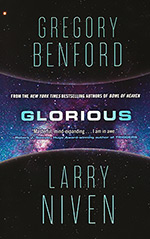
![]() thegooddoctor
thegooddoctor
12/5/2021
![]()
This bloated narrative is an example of why every author needs an editor - even (especially) authors like Larry Niven, who have "grown too big for their britches".
My rating is very low because of the mind-numbing drudgery of reading through long long passages - entire chapters - consisting entirely of gibberish. On occasion (around chapters 31 to 32, etc.), the poor reader is subjected to several chapters in a row of swimming through this verbal pablum! The inspired character names for some of the aliens, including "Twisty, Twisto and Twister", give a just a hint of how truly bad some of the writing here is.
There is actually a story buried here, within the novel, but very well-buried -- if you have the patience and fortitude to excavate the core story from the excessive 420 pages of text. This story would essentially be told within the first 2/5 of the book, consisting of the lead-up to the arrival at the Glory star system.
SPOILER ALERT - the following text includes some modest spoilers - purists will want to stop reading here. I will insert another, more robust spoiler alert if anything significant is to be disclosed.
I would say you could reasonably read up to and including the encounter with the gravity-wave emitter, and still be reading a competent science fiction novel. Following that encounter, you would need to be very selective in your reading to successfully evade the sargasso sea of substandard writing that the starship gets lost in. In any case, STOP there. My best advice is to seal yourself in your escape pod, pull the rip-cord, use the ejection seat, abandon ship, "Beam me up, Scottie" - whatever measures you must take to immediately exit the narrative -- after you reach the gravity wave emitter episode.
Much of this book is a very slow read. At times, you read for pages and pages and chapters and chapters, with very little physically happening. It is a very tall order -- to slow down the narrative, to have long extended passages where the only "action" is entirely cerebral." It requires a particular talent, one that Larry Niven and Gregory Benford do NOT demonstrate here. Think epic-fail! Authors who did have such a talent include J.G. Ballard and Ursula K. Le Guin. Examples from Ballard include the short stories: Track 12 (see The Penguin Science Fiction Omnibus, edited by Brian Aldiss) and The Drowned Giant. For Le Guin, there are numerous examples, including the short story: The Word of Unbinding and the novel Always Coming Home.
If you absolutely must read the Bowl of Heaven series, cease and desist after the second installment (Shipstar). Better yet, choose one of the excellent other novels by these authors. Timescape by Gregory Benford is a 1980 novel that won a well-deserved Nebula, and is one of the very finest winners of that award (or the Hugo, for that matter). It is widely regarded as one of the very finest depictions of a working scientist in SF. As for Larry Niven, there is plenty to choose from, whether you prefer novels, or shorter works. You could well start with any of the Hugo and Nebula award winners. I have read virtually everything by LN, and I am a huge fan - but all Niven is not created equal.
It's not that I object to long novels. A long, good novel is wonderful. For example, Vernor Vinge's Hugo award-winning novels A Fire Upon the Deep and A Deepness in the Sky are long, dense, and breath-takingly well-written. If you are looking for a long, excellent novel by Larry Niven, I recommend The Moat in God's Eye, a collaboration with Jerry Pournelle (as are many of his best novels). Other great options are The Legacy of Heorot (with JP, as well as Steven Barnes, another collaborator with whom LN has written top novels), and the (almost equally good) sequel Beowulf's Children.
Not to be overly negative, I would note that there are some good, well-developed characters in Glorious, including particularly Captain Redwing. His interactions with the various artilects (artificial intelligences) that advise him on aspects of the ship's functions are classic Niven. When Redwing says to the A.I. "That is above your pay-grade", the A.I misses the reference completely. The authors do go a little over-the-top with Redwing's "flying by the seat of your pants" characterization. At one point, when they are about to disembark, he tells his officers: "We'll just play it by ear". This approach seems a bit more appropriate for karaoke night than for a close encounter involving a star-ship with 1,000 plus lives on the line.
Other interesting characters include Beth Marble and Mayra Wickramsingh (both from the previous novels), Ashley Trust, Viviane, sky-fish captain Anorak, and BemorPrime.
A word about my rating system: I begin with one star being equivalent to a personal rating of "C -". Progressing upwards, I add ½ star for each step, up to the maximum 5 stars, which is equivalent to a rating of "A"+. I reserve ½ star for BOMBS, there being no option of zero or negative stars. This system seems far better to me than using, say 2 ½ stars for a mediocre book, and being left with very little room in the ratings to distinguish excellent books from average books.
The Good Doctor